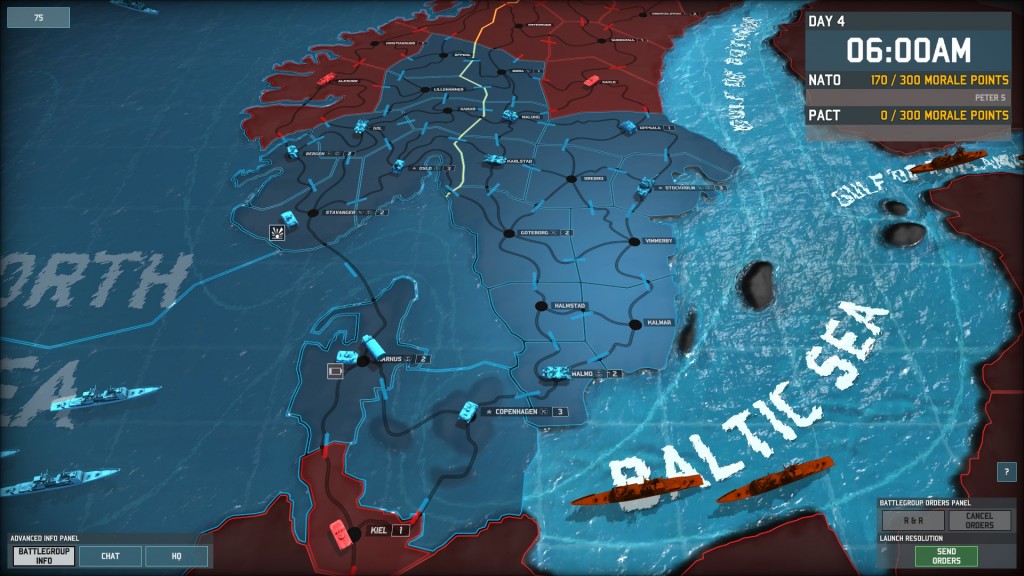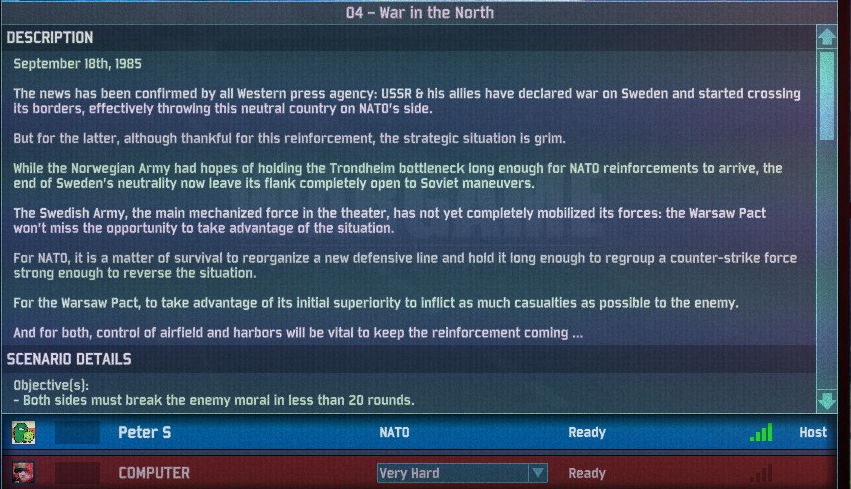This week, I present you with an orchestral rendition of some of gaming’s most iconic music. While I am not the world’s #1 Zelda player — I only picked up Twilight Princess around six months ago! — Link to the Past was one of my favourite games growing up. So the Zelda music always brings up happy memories of exploring Hyrule, fighting guards, and ignoring the plot — I could never get past those boulder traps in the Eastern Palace, so instead I just played LttP as though it were proto-Skyrim. Enjoy!
Month: June 2013
Hearts of Iron, Observations of Matchsticks
For the last decade, I’ve been a fan of Paradox Development Studio’s Hearts of Iron grand strategy games. HOI players control all aspects of their chosen nation during World War II: army, navy, and air force; diplomacy, espionage, scientific research, industrial output, and domestic politics. This can be as overwhelming as it sounds, and it’s interesting, and a little instructive, to compare the approaches taken by different games in the series.
The original Hearts of Iron (2002) was an unwieldy monstrosity, its vast scope at odds with its obsessive granularity. To build tanks, you had to separately research a tank chassis, and tank suspension, and tank propulsion, and choose a calibre for the gun, and repeat this for each model of tank… and yet, at the time, I loved it to bits. Hearts of Iron II (2005) was far more polished, with a far keener sense of what was genuine depth and what was just bloat, and I loved it too. Hearts of Iron III (2009) was poorly received at launch, but several expansions left it in much better shape. And lastly, Paradox eventually licensed HOI2 to several fan groups, which produced their own spin-offs; I tried two and enjoyed one, Darkest Hour (2011) (1).
Europa Universalis IV Q&A, with Thomas Johansson
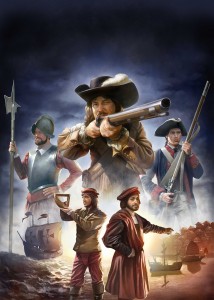 Europa Universalis IV is an upcoming grand strategy game by Paradox Development Studio, set during the early modern era of world history (roughly 1450 to 1800). When it was announced last year, it immediately caught my eye: I’m a long-time player of Paradox games (including the previous Europa Universalis titles); and to me, the game’s period is one of the most fascinating in history – its rich mix of global interactions ultimately laid the groundwork for our modern, industrialised world. So with the game due out in August 2013, just a couple of months away, the time seemed ripe for a chat with the developers. Read on for my email Q&A with Thomas Johansson, project lead for Europa Universalis IV.
Europa Universalis IV is an upcoming grand strategy game by Paradox Development Studio, set during the early modern era of world history (roughly 1450 to 1800). When it was announced last year, it immediately caught my eye: I’m a long-time player of Paradox games (including the previous Europa Universalis titles); and to me, the game’s period is one of the most fascinating in history – its rich mix of global interactions ultimately laid the groundwork for our modern, industrialised world. So with the game due out in August 2013, just a couple of months away, the time seemed ripe for a chat with the developers. Read on for my email Q&A with Thomas Johansson, project lead for Europa Universalis IV.
Europa Univeralis IV and other Paradox games
Peter Sahui: Paradox Development Studio’s last major release, Crusader Kings II, has also probably been its most successful to date (both critically, and in terms of its ability to break out beyond the traditional PDS niche). What lessons did you learn from CK2’s success, and how are you applying them to EU4?

Thomas Johansson: Crusader Kings II’s two biggest strengths were that it was well polished and we had worked hard on improving the interface. We worked hard with the tutorial, the hint system and to make it a very polished release. With Europa Universalis IV, we are aiming to do even better! Our goal is our most polished release to date and have the best interfaces we have ever created. The main focus of the whole development team is polishing the game and refining the interfaces.
What I also believe has really helped Crusader Kings II is that it was a breakthrough for gamers to realize that the game creates stories that you want to tell other people about. So the simple answer would be that it is a game that makes people talk about it, because they want to share their dramatic events, the intrigue, backstabbing and romances with their friends. Because it constantly surprises you. Just when you thought you had everything going and an easy road to power, money and conquering new territories – then you get stabbed in the back, your wife gets murdered and your sister steals your throne. Just like life… ;)
So the fact that the storytelling came across strong with Crusader Kings II, we hope that people can see that Europa Universalis IV also allows you yourself to create the stories when playing the game. You attack your neighbours, alliances gets broken, you get an incompetent ruler and need to get creative on how to handle his/hers strength and weaknesses while keeping your territory hungry opponents at bay.
Any questions for Eugen Systems?
I’m working on another interview, this one with Eugen Systems, developer of Act of War, Ruse and Wargame — anything you guys would like me to ask? At this stage I have a number of questions written down, mostly general rather than being Wargame-specific — Eugen’s inspirations, the evolution of its games, its future plans, how it sees the industry, that kind of thing. Very happy to take suggestions!
Musical Monday: “Adagio from Concierto de Aranjuez” (Hearts of Iron), composed by Joaquin Rodrigo
Since the release of World War 2 grand strategy game Hearts of Iron II, almost a decade ago, Paradox Development Studio has always set its games to original music by Andreas Waldetoft. But the original Hearts of Iron relied on pre-existing music — for instance, Wagner’s “Ride of the Valkyries”, Mussorgsky’s “The Great Gate of Kiev”, and this week’s theme, Rodrigo’s “Adagio”. While lovely, “Adagio” is neither heroic, nor bold, nor martial at all. It is melancholy and regretful (according to Wikipedia, one of Rodrigo’s inspirations was grief at his wife’s miscarriage), and perhaps that makes it appropriate for accompanying a game about World War 2. Worth thinking about while you listen to the song.
Wargame: AirLand Battle — The Verdict
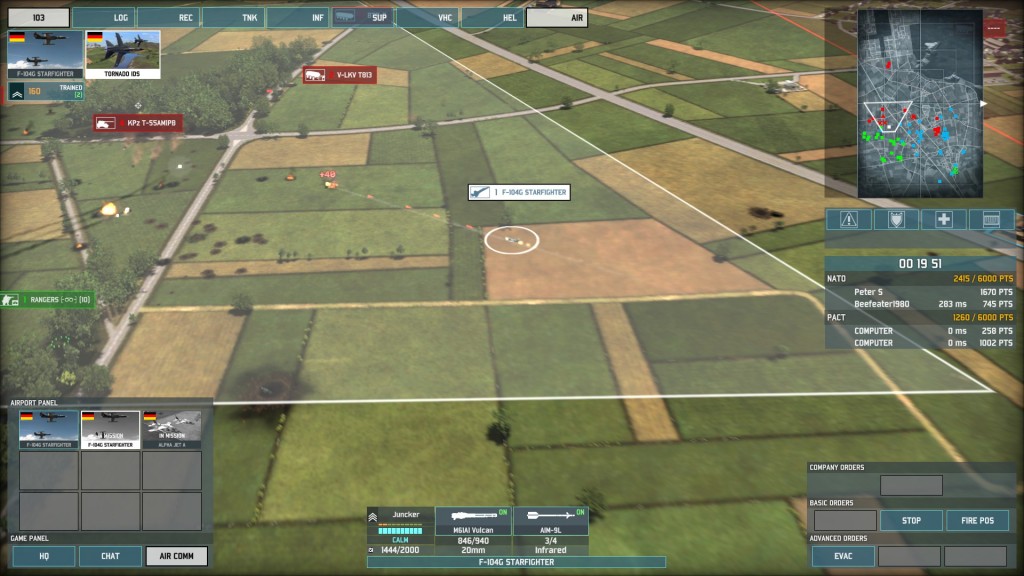
Eugen Systems, the studio behind Wargame: AirLand Battle, is now one of my favourite developers of strategy games, of historical games, and indeed, of historical strategy games.
I don’t say this lightly. That is exalted company to be in, alongside the likes of Paradox, Firaxis, and Creative Assembly, but I think it’s deserved. With AB, Eugen has demonstrated three things:
1. They can capture the spirit of a setting – in this case, a Cold War gone hot in Europe.
2. They know what makes a good strategy game: a series of interesting decisions that produce clear, understandable outcomes.
3. They can learn from past mistakes.
Crusader Kings II: The Old Gods, As Told in Classified Ads
Not a Review
For sale: 1 longboat fleet. 1 careful owner. 5,670 miles on the clock. Used for raiding around the Russ. No damage, good insurance record. Has provided years of joy and much treasure, sale by necessity only. Owner converted to Christianity so raiding no longer possible. All reasonable offers considered.
***
Hello good friend. I am King of Mercia, most Excellent Eadward the Bearded, and you help I am nedding. My Kingdom which is of Mercia being conquered by Vikings unJustly and against wishes of my own loving good people who like me their King in bad coup of conquests. I have large treasury (10,000,000 gold bits of pure gold) which i need to Trangsfer out of country without border taxes or being stealed by naughty People. You help me now and I make you Rich by giving you generous share of my large treaserary (10,000,000 coin in g0ld) being worth 10%. You ‘ll be a Rich man. All you need to do to Help me is send by fastest carrier pigeon your treasury key and guard passwords so that i can send by direct transfer directly the whole of my own treasury (10,000,000 peices of gold) under the label of a Random event choose Gift event choice 2. Then it arriving safely in your country and I giving you generous 10% of total to keep as to make you a Rich man who has lots of monies.
Replie immediately as this time limited offer due to Vikings killing everyone and robbing all my country. Remember: send treasury key and guard pastwords by fastest carrier pigeon now for lots of gain! Send carrying pigeons to: notascam@yesreally.co.uk
Yes, this great opportuinity for to Kind and great man who help Mighty king down on his luck with big treasury (10,000,000 golds!) due to Vikings.
***
Rebel with a clue seeks army for rebellion. No experience necessary; however, dedication to the cause is a must as aimless rebelling is no longer permitted. All applicants will be considered. Apprenticeships available for ages 18-24.
***
Let’s defend Scandinavia in Wargame: AirLand Battle! Part 2 (FINAL): Who Dares, Wins
Welcome back to my Let’s Play of Wargame: AirLand Battle!
In Part 1 of this LP, my effort to defend Scandinavia (playing NATO in the War in the North campaign) got off to a promising start:
1. The Danish army wiped out two Warsaw Pact brigades that attempted to seize Aarhus;
2. The Swedish army did the same with an amphibious landing at Malmo;
3. As at the end of the last instalment, the Swedish and Norwegian armies had recovered their fighting trim and were in position along an Oslo-Stockholm defensive line.
What were the key lessons learned? First – and I am indebted to this excellent guide from the official forum – that the objective in battle isn’t to kill so many of the enemy that the survivors run away, it’s to wipe them out (which will earn me the morale points I need to win the campaign). In game terms, that means (a) pinching off the enemy reinforcement sectors so they can’t retreat, and then (b) win the battle by hunting down their command vehicles. Unable to flee, the losers will surrender.
In practice, the campaign is designed such that it is difficult to decisively win battles unless there is a large discrepancy (due to some combination of morale, initiative, positioning, and equipment) between the combatants. Otherwise the two forces tend to get stuck in a spiral of falling initiative (reducing the forces they can deploy) and increasing morale (making it harder for them to rout the other), broken only when the arrival of a fresh brigade tips the balance. Other players have complained about this, and I can see both sides of the argument; I like what the developers were aiming for, but I do agree it could do with some reworking.
For present purposes, though, what the rules should be is beside the point. The key is to focus on what the rules are, and if I need to engineer massive mismatches to win, then that is what I shall do. That means (a) ensuring each sector of the line has fresh brigades in reserve, so that they can polish off a weakened enemy, and (b) conserving my strategic buffs/debuffs (e.g. air raids) until the time is right.
With that in mind, let’s see how the rest of my Nordic campaign plays out.
Musical Monday: “Memoro de la Stono ~ Distant Worlds” (Distant Worlds: Music from Final Fantasy XI), composed by Nobuo Uematsu
Happy Queen’s Birthday to my fellow Aussies! This week’s song is actually a two-in-one medley created for the Distant Worlds orchestral concert, with both parts taken from a game I haven’t played, MMORPG Final Fantasy XI. I personally prefer the first half, a sweeping choral piece (“Memoro de la Stono”), as I find the lyrics in the second half (“Distant Worlds”) a little cheesy. However, the song remains excellent and well worth listening to. Enjoy!
Let’s defend Scandinavia in Wargame: AirLand Battle! Part 1: Something Rotten in Denmark
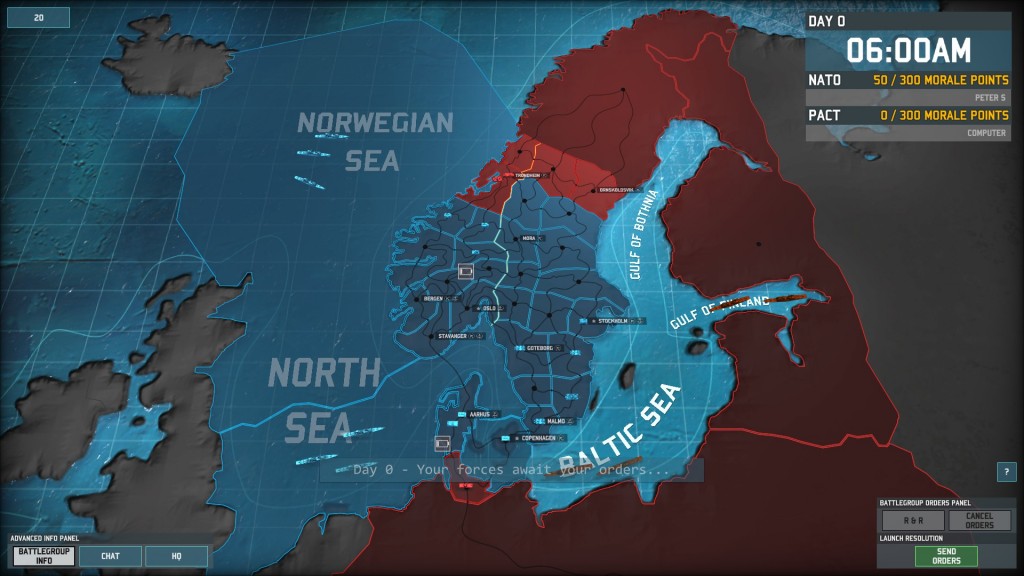
March 1985, Moscow. Mikhail Gorbachev loses the race to succeed Konstantin Chernenko as head of the USSR.
Early September, 1985. A clash between Soviet and US Navy aircraft leaves several pilots dead. The world totters on the brink of war.
Late September, 1985. World War III erupts. Norway and Denmark, comprising NATO’s northern flank, are on the front line. The Norwegian army manages to halt the Soviet advance – only for Soviet troops to roll into neutral Sweden, threatening Norway’s eastern flank. To the south, the Soviet advance into West Germany leaves their forces on the border with Denmark.
NATO’s troops are badly battered. Enemy reinforcements abound. Scandinavia hangs in the balance. Can my leadership save the day?
Welcome to my Let’s Play of Wargame: AirLand Battle.
Introduction
Wargame: AirLand Battle is a newly released strategy game for PC, a blend between the real-time strategy and traditional wargame genres (for more background, check out the other posts I’ve written about the Wargame series, linked at the top of this page). In addition to multiplayer and skirmish modes, AB offers four single-player campaigns of varying length and difficulty; I have finished the shortest and simplest campaign, which is really a tutorial in disguise. For this LP, I will be jumping all the way to the longest and most challenging, “War in the North”.
The game bills this campaign as “Very Hard”, but I’m confident I’ll be up to it. (And, hey, everything worked out the last time I LPed a difficult game.) I will play the campaign either until I win/lose, or until it stops being fun. Here goes!

